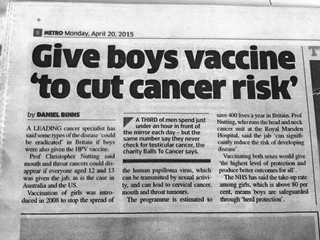Leading cancer specialist joins campaign for boys to have HPV vaccination
 Prof Christopher Nutting, a leading cancer specialist, has joined the campaign for the NHS-administered HPV vaccine to be given to boys and well as girls.
Prof Christopher Nutting, a leading cancer specialist, has joined the campaign for the NHS-administered HPV vaccine to be given to boys and well as girls.
All girls aged 12 to 13 are offered HPV (human papilloma virus) vaccination as part of the NHS childhood vaccination programme to protect against cervical cancer.
The programme was introduced in 2008 and it is estimated that about 400 lives will be saved every year in the UK as a result of vaccinating girls with Gardasil, which provides protection for at least 20 years.
HPV is easily spread by sexual activity and in most cases the virus doesn’t do any harm because the body’s immune system successfully fights the infection.
However in almost all cervical cancer cases, there is a history of infection with high-risk types of HPV. Nearly 3,000 women are diagnosed with cervical cancer every year in the UK.
Professor Christopher Nutting, head of the Head and Neck Cancer unit at The Royal Marsden Hospital, believes the vaccination programme should be extended to boys of the same age because of the links between HPV and other cancers including the mouth and throat.
He is one of hundreds of experts in 36 leading patient and professional organisations who have joined a campaign HPV Action that is lobbying the government and campaigning for the vaccine programme to be offered on a ‘gender-neutral’ basis so it offers wider protection.
Professor Nutting said: “HPV can cause cancers in the back of the throat, most commonly in the base of the tongue and tonsils, in an area known as the oropharynx. Cancer caused by HPV often takes years to develop after initially getting an HPV infection. There may be other factors, such as smoking, which interacts with HPV to cause the oropharynx cancer and more research is needed in this area.
“However there is a clear case that HPV vaccination can significantly reduce the risk of developing disease and vaccinating both sexes provides the highest level of protection and will produce better outcomes for all and reduce health inequality.”
Professor Nutting spoke out at the start of European Immunization Week which begins today (Mon April 20th).
The NHS argues that the high take-up rate of the vaccination among girls – currently exceeding 80% – means that boys will automatically safeguarded against HPV infection through ‘herd protection.’
But Professor Nutting said: “The current cost-effectiveness analysis does not include the protective effect of HPV vaccination against head, neck, anal and penile cancers. Why doesn’t the UK follow the example of the US, Canada, Austria and Australia and recommend vaccination for boys as well as girls?”
The HPV vaccine is delivered largely through secondary schools, and consists of two injections into the upper arm spaced at least six, and not more than 24, months apart while girls who began vaccination before September last year receive three injections.
For more information about Prof Nutting's work please visit the CV page, get in touch or arrange a consultation.


